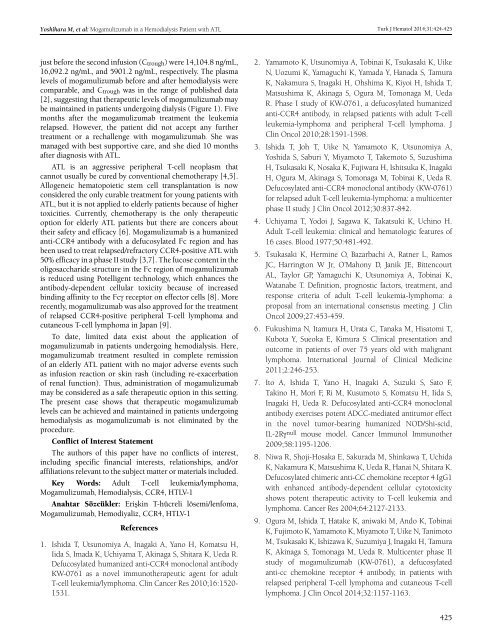Turkish Journal of Hematology Volume: 31 - Issue: 4
You also want an ePaper? Increase the reach of your titles
YUMPU automatically turns print PDFs into web optimized ePapers that Google loves.
Yoshihara M, et al: Mogamulizumab in a Hemodialysis Patient with ATL Turk J Hematol 2014;<strong>31</strong>:424-425<br />
just before the second infusion (Ctrough) were 14,104.8 ng/mL,<br />
16,092.2 ng/mL, and 5901.2 ng/mL, respectively. The plasma<br />
levels <strong>of</strong> mogamulizumab before and after hemodialysis were<br />
comparable, and Ctrough was in the range <strong>of</strong> published data<br />
[2], suggesting that therapeutic levels <strong>of</strong> mogamulizumab may<br />
be maintained in patients undergoing dialysis (Figure 1). Five<br />
months after the mogamulizumab treatment the leukemia<br />
relapsed. However, the patient did not accept any further<br />
treatment or a rechallenge with mogamulizumab. She was<br />
managed with best supportive care, and she died 10 months<br />
after diagnosis with ATL.<br />
ATL is an aggressive peripheral T-cell neoplasm that<br />
cannot usually be cured by conventional chemotherapy [4,5].<br />
Allogeneic hematopoietic stem cell transplantation is now<br />
considered the only curable treatment for young patients with<br />
ATL, but it is not applied to elderly patients because <strong>of</strong> higher<br />
toxicities. Currently, chemotherapy is the only therapeutic<br />
option for elderly ATL patients but there are concers about<br />
their safety and efficacy [6]. Mogamulizumab is a humanized<br />
anti-CCR4 antibody with a defucosylated Fc region and has<br />
been used to treat relapsed/refractory CCR4-positive ATL with<br />
50% efficacy in a phase II study [3,7]. The fucose content in the<br />
oligosaccharide structure in the Fc region <strong>of</strong> mogamulizumab<br />
is reduced using Potelligent technology, which enhances the<br />
antibody-dependent cellular toxicity because <strong>of</strong> increased<br />
binding affinity to the Fcγ receptor on effector cells [8]. More<br />
recently, mogamulizumab was also approved for the treatment<br />
<strong>of</strong> relapsed CCR4-positive peripheral T-cell lymphoma and<br />
cutaneous T-cell lymphoma in Japan [9].<br />
To date, limited data exist about the application <strong>of</strong><br />
mogamulizumab in patients undergoing hemodialysis. Here,<br />
mogamulizumab treatment resulted in complete remission<br />
<strong>of</strong> an elderly ATL patient with no major adverse events such<br />
as infusion reaction or skin rash (including re-exacerbation<br />
<strong>of</strong> renal function). Thus, administration <strong>of</strong> mogamulizumab<br />
may be considered as a safe therapeutic option in this setting.<br />
The present case shows that therapeutic mogamulizumab<br />
levels can be achieved and maintained in patients undergoing<br />
hemodialysis as mogamulizumab is not eliminated by the<br />
procedure.<br />
Conflict <strong>of</strong> Interest Statement<br />
The authors <strong>of</strong> this paper have no conflicts <strong>of</strong> interest,<br />
including specific financial interests, relationships, and/or<br />
affiliations relevant to the subject matter or materials included.<br />
Key Words: Adult T-cell leukemia/lymphoma,<br />
Mogamulizumab, Hemodialysis, CCR4, HTLV-1<br />
Anahtar Sözcükler: Erişkin T-hücreli lösemi/lenfoma,<br />
Mogamulizumab, Hemodiyaliz, CCR4, HTLV-1<br />
References<br />
1. Ishida T, Utsunomiya A, Inagaki A, Yano H, Komatsu H,<br />
Iida S, Imada K, Uchiyama T, Akinaga S, Shitara K, Ueda R.<br />
Defucosylated humanized anti-CCR4 monoclonal antibody<br />
KW-0761 as a novel immunotherapeutic agent for adult<br />
T-cell leukemia/lymphoma. Clin Cancer Res 2010;16:1520-<br />
15<strong>31</strong>.<br />
2. Yamamoto K, Utsunomiya A, Tobinai K, Tsukasaki K, Uike<br />
N, Uozumi K, Yamaguchi K, Yamada Y, Hanada S, Tamura<br />
K, Nakamura S, Inagaki H, Ohshima K, Kiyoi H, Ishida T,<br />
Matsushima K, Akinaga S, Ogura M, Tomonaga M, Ueda<br />
R. Phase I study <strong>of</strong> KW-0761, a defucosylated humanized<br />
anti-CCR4 antibody, in relapsed patients with adult T-cell<br />
leukemia-lymphoma and peripheral T-cell lymphoma. J<br />
Clin Oncol 2010;28:1591-1598.<br />
3. Ishida T, Joh T, Uike N, Yamamoto K, Utsunomiya A,<br />
Yoshida S, Saburi Y, Miyamoto T, Takemoto S, Suzushima<br />
H, Tsukasaki K, Nosaka K, Fujiwara H, Ishitsuka K, Inagaki<br />
H, Ogura M, Akinaga S, Tomonaga M, Tobinai K, Ueda R.<br />
Defucosylated anti-CCR4 monoclonal antibody (KW-0761)<br />
for relapsed adult T-cell leukemia-lymphoma: a multicenter<br />
phase II study. J Clin Oncol 2012;30:837-842.<br />
4. Uchiyama T, Yodoi J, Sagawa K, Takatsuki K, Uchino H.<br />
Adult T-cell leukemia: clinical and hematologic features <strong>of</strong><br />
16 cases. Blood 1977;50:481-492.<br />
5. Tsukasaki K, Hermine O, Bazarbachi A, Ratner L, Ramos<br />
JC, Harrington W Jr, O’Mahony D, Janik JE, Bittencourt<br />
AL, Taylor GP, Yamaguchi K, Utsunomiya A, Tobinai K,<br />
Watanabe T. Definition, prognostic factors, treatment, and<br />
response criteria <strong>of</strong> adult T-cell leukemia-lymphoma: a<br />
proposal from an international consensus meeting. J Clin<br />
Oncol 2009;27:453-459.<br />
6. Fukushima N, Itamura H, Urata C, Tanaka M, Hisatomi T,<br />
Kubota Y, Sueoka E, Kimura S. Clinical presentation and<br />
outcome in patients <strong>of</strong> over 75 years old with malignant<br />
lymphoma. International <strong>Journal</strong> <strong>of</strong> Clinical Medicine<br />
2011;2:246-253.<br />
7. Ito A, Ishida T, Yano H, Inagaki A, Suzuki S, Sato F,<br />
Takino H, Mori F, Ri M, Kusumoto S, Komatsu H, Iida S,<br />
Inagaki H, Ueda R. Defucosylated anti-CCR4 monoclonal<br />
antibody exercises potent ADCC-mediated antitumor effect<br />
in the novel tumor-bearing humanized NOD/Shi-scid,<br />
IL-2Rγ null mouse model. Cancer Immunol Immunother<br />
2009;58:1195-1206.<br />
8. Niwa R, Shoji-Hosaka E, Sakurada M, Shinkawa T, Uchida<br />
K, Nakamura K, Matsushima K, Ueda R, Hanai N, Shitara K.<br />
Defucosylated chimeric anti-CC chemokine receptor 4 IgG1<br />
with enhanced antibody-dependent cellular cytotoxicity<br />
shows potent therapeutic activity to T-cell leukemia and<br />
lymphoma. Cancer Res 2004;64:2127-2133.<br />
9. Ogura M, Ishida T, Hatake K, aniwaki M, Ando K, Tobinai<br />
K, Fujimoto K, Yamamoto K, Miyamoto T, Uike N, Tanimoto<br />
M, Tsukasaki K, Ishizawa K, Suzumiya J, Inagaki H, Tamura<br />
K, Akinaga S, Tomonaga M, Ueda R. Multicenter phase II<br />
study <strong>of</strong> mogamulizumab (KW-0761), a defucosylated<br />
anti-cc chemokine receptor 4 antibody, in patients with<br />
relapsed peripheral T-cell lymphoma and cutaneous T-cell<br />
lymphoma. J Clin Oncol 2014;32:1157-1163.<br />
425

















